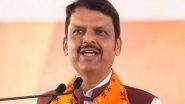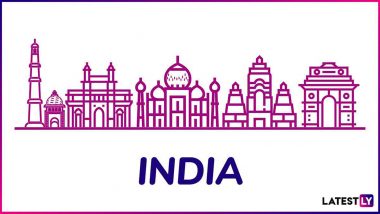Pune, Jun 16 (PTI) Union Minister of State for Education Subhas Sarkar on Friday called for collaborative efforts to explore multi-dimensional aspects of Indian knowledge systems, including "vastu vidya".
Sarkar also emphasised the importance of removing barriers to knowledge, promoting transparency and fostering multi-disciplinary collaborations. The minister made the comments at the inauguration of precursor events ahead of the fourth G20 Education Working Group and Education Ministers meeting.
Also Read | CBI Court Acquits Accused in Karnataka College Student Rape, Murder Case After 11 Years.
"There is potential for collaborative efforts to explore multi-dimensional aspects of Indian knowledge systems, including Ganita and Jyamiti (Indian system of Mathematics and Geometry) and Vastu Vidya (Indian system of Architecture). It is very important to remove barriers to knowledge, promoting transparency, and fostering multidisciplinary collaborations," he said.
The precursor events began here on Friday with a seminar on "Accessible Science: Fostering Collaboration", organised at the Indian Institute of Science Education and Research (IISER) in collaboration with ELSEVIER.
The minister also launched a report, titled "The status and relevance of research collaborations for development, considering G20 nations" on the occasion.
Higher Education Secretary Sanjay Murthy said, "NEP (National Education Policy) 2020 speaks about reaching out to institutions within and outside the country to improve our research output. The discussions and report launched today will lead to avenues and knowledge on how to further research collaboration and enhance regulatory framework to provide solutions to the global challenges."
Nick Fowler, Chief Academic Officer at Elsevier, noted that India's scholarly output has been steadily increasing.
"India is the third largest producer of scientific research, overtaking the UK in 2022. But India has not only succeeded in volume of research output, it also boasts achievements in academic quality. Field Weighted Citation Impact has jumped up from 0.85 in 2019 to 1.05 in 2021, putting India above the global average for publication citations," he said.
Carlos Henrique de Brito Cruz, Senior VP, Elsevier, noted India's surge in the global scientific community.
"India is bound to become to be the second largest publisher in AI-related topics with oldest AI article with Indian authors dating back to August 1968," Cruz said.
The seminar is part of the ongoing fourth and final Education Working Group meeting scheduled from June 19 to 21.
The overarching theme of the meeting is "Ensuring Foundation Literacy and Numeracy, especially in the context of blended learning." The EDWG meeting comprises various precursor events, seminars, exhibitions, heritage excursions, and will culminate with the Education Ministerial meeting on June 22.
On the sidelines of the meeting, an exhibition will be inaugurated on June 17 which will showcase innovative practices being adopted in education and foundational literacy and numeracy, digital initiatives, research and skill development, in particular by states and Union territories, besides other agencies in the field of education.
The first meeting of the G20 Education Working Group was held in Chennai in January, followed by the second meet in Amritsar in March and the third in Bhubaneswar in April.
(This is an unedited and auto-generated story from Syndicated News feed, LatestLY Staff may not have modified or edited the content body)













 Quickly
Quickly

















